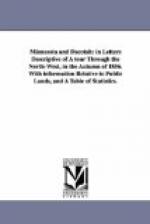55 _______
PART IV.
Preemption for city or town sites. _______
Preemption for city or town sites.
At a late moment, and while the volume is in press, I am enabled to present the following exposition of the Preemption Law, addressed to the Secretary of the Interior by Mr. Attorney-General Cushing. (See “Opinions of Attorneys General,” vol. 7, 733-743— in press.)
Preemption for city or town sites.
Portions of the public lands, to the amount of three hundred and twenty acres, may be taken up by individuals or preemptioners for city or town sites.
The same rules as to proof of occupation apply in the case of municipal, as of agricultural, preemption.
The statute assumes that the purposes of a city or town have preference over those of trade or of agriculture.
Attorneygeneral’s office
July 2, 1856.
Sir: Your communication of the 20th May, transmitting papers regarding Superior City (so called) in the State of Wisconsin, submits for consideration three precise questions of law; two of them presenting inquiry of the legal relations of locations for town sites on the public domain, and the third presenting inquiry of another matter, which, although pertinent to the case, yet is comprehended in a perfectly distinct class of legal relations.
I propose, in this communication, to reply only upon the two first questions.
The act of Congress of April 24, 1841, entitled “An act to appropriate the proceeds of the sales of the public lands and to grant preemption rights,” contains, in section 10th, the following provisions: “no lands reserved for the support of schools, nor lands acquired by either of the two last treaties with the Miami tribe of Indians in the State of Indiana, or which may be acquired of the Wyandot tribe of Indians in the State of Ohio, or other Indian reservation to which the title has been or may be extinguished by the United States at any time during the operation of this act; no sections of lands reserved to the United States alternate to other sections of land granted to any of the States for the construction of any canal, railroad, or other public improvement; no sections or fractions of sections included within the limits of any incorporated town; no portions of the public lands which have been selected for the site of a city or town; no parcel of a lot of land actually settled or occupied for the purposes of trade and not agriculture; and no lands on which are situated any known salines or mines, shall be liable to entry under or by virtue of this act.” (v Stat. at Large, p. 456.)
An act passed May 28, 1844, entitled “An act for the relief of citizens of towns upon the lands of the United States under certain circumstances,” provides as follows:




